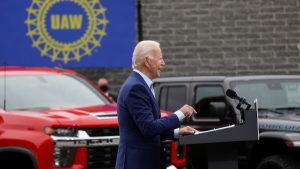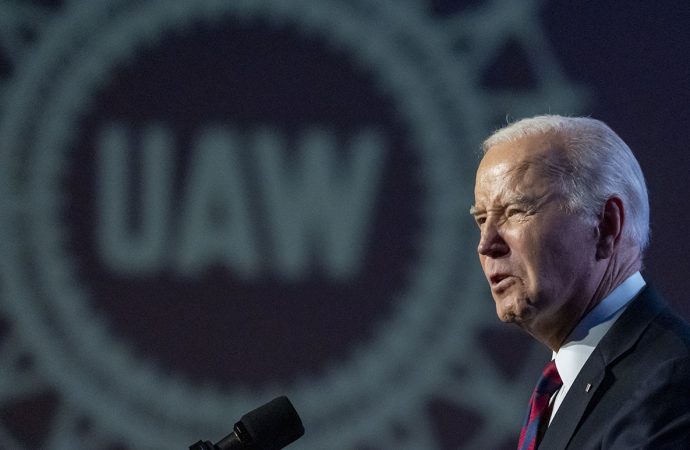Introduction The United Auto Workers (UAW) union has officially endorsed President Joe Biden for re-election, recognizing his support for labor rights and American manufacturing. However, the endorsement comes with a note of caution. While the union appreciates Biden’s efforts to protect jobs and strengthen unions, it remains concerned about the pace and direction of changes
Introduction
The United Auto Workers (UAW) union has officially endorsed President Joe Biden for re-election, recognizing his support for labor rights and American manufacturing. However, the endorsement comes with a note of caution. While the union appreciates Biden’s efforts to protect jobs and strengthen unions, it remains concerned about the pace and direction of changes in the auto industry, particularly with the push toward electric vehicles (EVs) and automation. The UAW’s stance reflects the delicate balance between supporting a political ally and protecting its members’ livelihoods.
Why the UAW Chose to Endorse Biden
The UAW’s endorsement is rooted in Biden’s history of pro-labor policies. Since taking office, he has emphasized the importance of American-made products, encouraged union membership, and supported worker-friendly legislation. His administration has also invested in infrastructure and clean energy, aiming to create more manufacturing jobs in the United States.
For many union members, Biden represents a leader who understands the struggles of working-class Americans. His visits to picket lines and public statements in favor of organized labor have earned him credibility among workers. This commitment was a significant factor in securing the UAW’s endorsement.
The Caution Behind the Support
Despite the endorsement, the UAW is not giving Biden a blank check. The rapid transformation of the automotive industry—driven by electric vehicle adoption, advanced technology, and shifting supply chains—has raised concerns about job security.
Electric vehicles require fewer parts and less labor to produce than traditional gasoline-powered cars. This could lead to job losses in assembly plants and parts manufacturing. The union is also wary of overseas competition, as automakers seek cheaper production options outside the United States.
UAW leadership has made it clear that while they support a transition to cleaner technology, it must be done in a way that safeguards existing jobs and creates new opportunities for unionized workers.
The EV Transition and Job Security
One of the biggest challenges facing the auto industry is the move toward electric vehicles. The Biden administration has set ambitious goals for EV production and adoption, offering incentives to both manufacturers and consumers.
For the UAW, this shift brings mixed feelings. On one hand, EV production can open the door to new manufacturing plants and investments in battery technology. On the other hand, the reduced need for mechanical parts in EVs could mean fewer jobs in certain sectors.
Union leaders are calling for strong labor agreements that guarantee new EV jobs will be union jobs with fair wages and benefits. Without such protections, they fear the transition could weaken the labor force instead of strengthening it.
Automation and Industry Modernization
Beyond the shift to EVs, automation poses another challenge. Many automakers are investing in robotics and AI to increase production efficiency. While these advancements can improve safety and reduce costs, they also risk displacing human workers.
The UAW is pushing for retraining programs to ensure workers can transition into new roles created by technology. This approach could help maintain employment levels while allowing the industry to modernize.
Biden’s Balancing Act

Image by: Yandex.com
President Biden faces a difficult task—balancing environmental goals with the need to protect American jobs. His administration’s clean energy agenda includes billions of dollars for EV infrastructure, such as charging stations and battery plants.
At the same time, he must address the concerns of unions like the UAW, which want guarantees that these new jobs will be located in the U.S. and covered by union agreements. Biden’s political future depends partly on maintaining strong relationships with labor groups, especially in key battleground states where union support can influence election outcomes.
The Political Impact of the Endorsement
The UAW’s endorsement carries significant political weight. Union members represent a large and influential voting bloc, particularly in states like Michigan, Ohio, and Pennsylvania. By backing Biden, the UAW signals to its members that his policies are more aligned with their interests than his opponents’.
However, the cautious tone of the endorsement sends a clear message: support is conditional. If the administration fails to protect union jobs during the industry’s transformation, it could face backlash from workers who feel left behind.
Industry Collaboration Moving Forward
For the auto industry to thrive during this transition, cooperation between the government, unions, and manufacturers will be essential. This includes:
- Negotiating fair labor agreements for EV and battery plant workers
- Investing in worker retraining programs
- Ensuring domestic production incentives benefit American workers
- Maintaining competitive wages and benefits across the sector
The UAW’s endorsement of Biden is not just a political statement—it’s an invitation to work together on shaping the future of American manufacturing.
The Road Ahead for the UAW and Biden
Both the UAW and President Biden have a shared interest in ensuring the U.S. auto industry remains strong. This means finding solutions that balance innovation with job security. The coming years will test whether these goals can align, as the industry faces global competition, technological disruption, and environmental demands.
If managed well, the transition could lead to a stronger, more sustainable industry with opportunities for workers across the country. But if mishandled, it risks weakening one of America’s most important economic sectors.
Conclusion
The United Auto Workers’ endorsement of President Biden highlights a shared vision for protecting workers and promoting American manufacturing. However, the union’s caution reflects real concerns about the pace of industry changes, particularly with electric vehicles and automation. Moving forward, collaboration between the government, unions, and automakers will be crucial in ensuring that progress does not come at the expense of jobs. The future of the auto industry depends on finding the right balance between innovation and worker protection—a challenge that will define the years ahead.

















Leave a Comment
Your email address will not be published. Required fields are marked with *